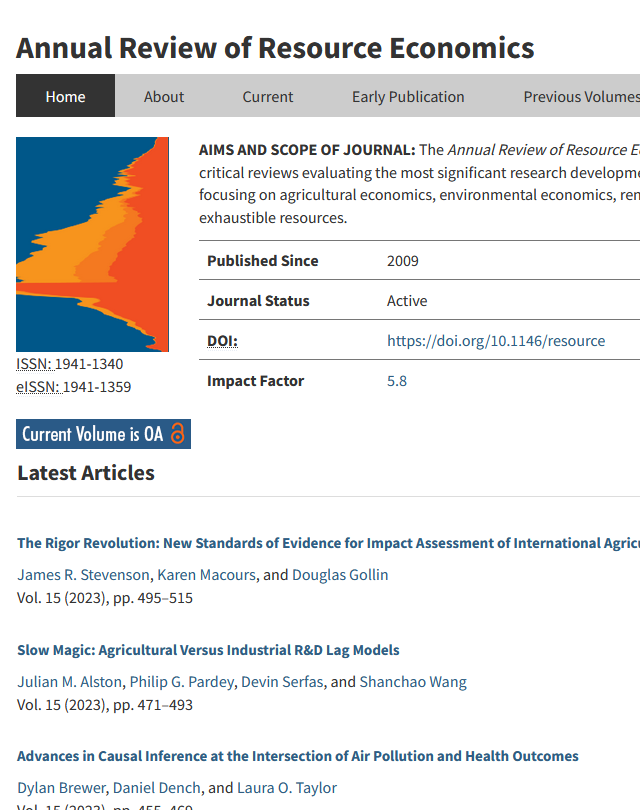The Economics of Household Water Access: A Review and Research Roadmap for “Water for All”
IF 8.4
2区 经济学
Q1 AGRICULTURAL ECONOMICS & POLICY
Annual Review of Resource Economics
Pub Date : 2025-05-20
DOI:10.1146/annurev-resource-121223-014639
引用次数: 0
Abstract
Ensuring universal access to clean water remains one of the most pressing global challenges, particularly in low-income countries. Despite considerable efforts under the United Nations Millennium Development Goal and Sustainable Development Goals, progress has been uneven, with persistent gaps in infrastructure financing and service delivery. In this review, we critically assess current measurements of water access, which fail to capture the true state of access. Standard metrics often emphasize the presence of infrastructure. We propose using dynamic measurement frameworks that go beyond infrastructure presence and include indicators for reliability, temporal variability, quality, affordability, and gender-based disparities. We also examine the potential and limitations of emerging technologies in measuring water access. To complement improved measurement, we review evaluation practices of water interventions, which are dominated by experimental methods. While these methods are useful for identifying causal impacts, they often overlook key factors such as long-term functionality, maintenance challenges, user and community engagement, and local institutional capacity that determine the effectiveness and sustainability of water access solutions. We argue for combining quantitative impact evaluation methods with qualitative evaluation methods to address these gaps and better understand how water interventions interact with complex socioeconomic, environmental, and behavioral factors.家庭用水经济学:“人人享有水”的回顾与研究路线图
确保普遍获得清洁水仍然是最紧迫的全球挑战之一,特别是在低收入国家。尽管在联合国千年发展目标和可持续发展目标下做出了巨大努力,但进展并不平衡,基础设施融资和服务提供方面仍然存在差距。在这篇综述中,我们批判性地评估了目前的水获取测量方法,这些方法未能捕捉到水获取的真实状态。标准度量常常强调基础设施的存在。我们建议使用超越基础设施存在的动态测量框架,并包括可靠性、时间变异性、质量、可负担性和性别差异等指标。我们还研究了新兴技术在测量水资源获取方面的潜力和局限性。为了补充改进的测量方法,我们回顾了以实验方法为主的水干预评估实践。虽然这些方法有助于确定因果影响,但它们往往忽视了长期功能、维护挑战、用户和社区参与以及地方机构能力等关键因素,而这些因素决定了供水解决方案的有效性和可持续性。我们主张将定量影响评估方法与定性评估方法相结合,以解决这些差距,并更好地了解水干预措施如何与复杂的社会经济、环境和行为因素相互作用。
本文章由计算机程序翻译,如有差异,请以英文原文为准。
求助全文
约1分钟内获得全文
求助全文
来源期刊

Annual Review of Resource Economics
AGRICULTURAL ECONOMICS & POLICY-
CiteScore
9.40
自引率
0.00%
发文量
34
期刊介绍:
The Annual Review of Resource Economics provides authoritative critical reviews evaluating the most significant research developments in resource economics, focusing on agricultural economics, environmental economics, renewable resources, and exhaustible resources.
 求助内容:
求助内容: 应助结果提醒方式:
应助结果提醒方式:


